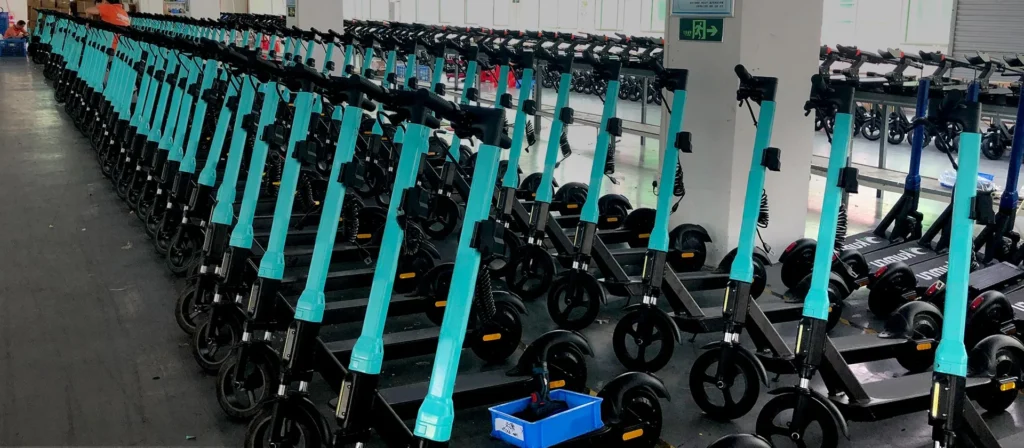Introduction: A Micro-Mobility Revolution

The bustling streets of urban centers have long been dominated by cars, buses, and bicycles as the primary means of transportation. However, in recent years, a new player has emerged on the urban mobility scene – shared e-scooters. These compact, electric-powered scooters have swiftly gained popularity in cities worldwide, offering a convenient and eco-friendly alternative for short-distance travel. As they become a common sight on sidewalks and bike lanes, it’s essential to explore how shared e-scooters reshape urban mobility and influence how we navigate our cities.
The Rise of Shared e-Scooters: A Brief Overview

To understand the impact of shared e-scooters on urban mobility, let’s first explore their rapid rise. In just a few years, these micro-mobility devices have increased in major cities globally, thanks to the convenience they offer for short trips within urban areas. Users can locate and unlock these scooters with a simple tap on their smartphones, making them easily accessible for anyone with a smartphone who wants to travel efficiently. The combination of ease of use, low cost, and reduced environmental impact has led to a surge in their popularity among commuters, tourists, and residents alike.
How Shared e-Scooters are Changing Urban Mobility?

1. Last-Mile Connectivity and Improved Accessibility
One primary way shared e-scooters transform urban mobility is by addressing the “last-mile” problem. Many individuals who rely on public transportation often face the challenge of getting to and from transit stops to their final destination. Shared e-scooters fill this gap by providing a convenient solution for short-distance trips, making it easier for people to travel to their intended locations without needing a personal vehicle or lengthy walks.
2. Reduced Traffic Congestion
Traffic congestion is a common issue in urban areas, leading to increased travel times and higher levels of air pollution. Shared e-scooters offer a viable solution to reduce congestion as they take up significantly less space on the road than cars or buses. By encouraging these scooters for short trips, cities can alleviate traffic congestion, leading to smoother traffic flow and improved overall transportation efficiency.
3. Environmental Benefits
With conventional petrol vehicles a major contributor to air pollution and greenhouse gas emissions, the environmental impact of transport has become a pressing concern. Shared e-scooters present a greener alternative, as they are powered by electricity and produce zero tailpipe emissions. Embracing e-scooters as part of the urban mobility mix can contribute to lowering carbon footprints, improving air quality, and working towards more sustainable cities.
4. Flexibility and User-Centric Travel
Shared e-scooters offer a level of flexibility that resonates with modern commuters. Users can quickly pick up and drop off scooters at various locations within the city, providing a personalized and on-demand travel experience. This user-centric approach aligns with the preferences of today’s urban dwellers who seek efficient, personalized, and spontaneous travel options.
5. Enhancing Multi-Modal Transportation
In urban environments, a diverse range of transportation options is essential to meet the varying needs of residents and visitors. Shared e-scooters complement existing public transit systems and other forms of micro-mobility, such as bike-sharing, by offering another layer of mobility choice. This integration of multi-modal transportation fosters a more interconnected and efficient urban mobility network.
Safety and Regulation Concerns
While the rise of shared e-scooters presents numerous benefits, it has also raised concerns regarding safety and regulation. Some cities have witnessed increased accidents and injuries related to e-scooter use. Proper infrastructure planning, transparent rules, and user education are crucial to mitigate these risks and ensure safe coexistence with pedestrians and other road users.
Conclusion
In conclusion, the rise of shared e-scooters represents a significant shift in urban mobility paradigms. These compact, electric-powered vehicles offer an eco-friendly, convenient, and efficient means of transport for short trips within cities. As shared e-scooters continue to gain popularity, they are reshaping urban mobility by addressing last-mile connectivity, reducing traffic congestion, and providing a greener alternative to traditional transportation. To fully unlock the potential of shared e-scooters, cities must balance promoting micro-mobility adoption and ensuring safety through thoughtful regulation and infrastructure planning. Embracing these advancements in urban mobility will undoubtedly pave the way for more sustainable, interconnected, and livable future cities.
Experience the Future of Urban Mobility with Freego
Are you ready to embrace the future of urban mobility? At Freego, we are committed to revolutionizing how we travel within cities. Our innovative electric scooters and micro-mobility solutions offer a greener, more convenient, and user-centric approach to urban transportation. With cutting-edge technology and a focus on sustainability, Freego is at the forefront of the shared e-scooter revolution.
Join us on this journey towards a cleaner, more efficient urban mobility landscape. Experience the freedom of shared e-scooters and contribute to creating greener, more connected cities for future generations. Visit our website to learn more about our micro-mobility offerings and be part of the positive change in urban transportation.